 Petzlover
Petzlover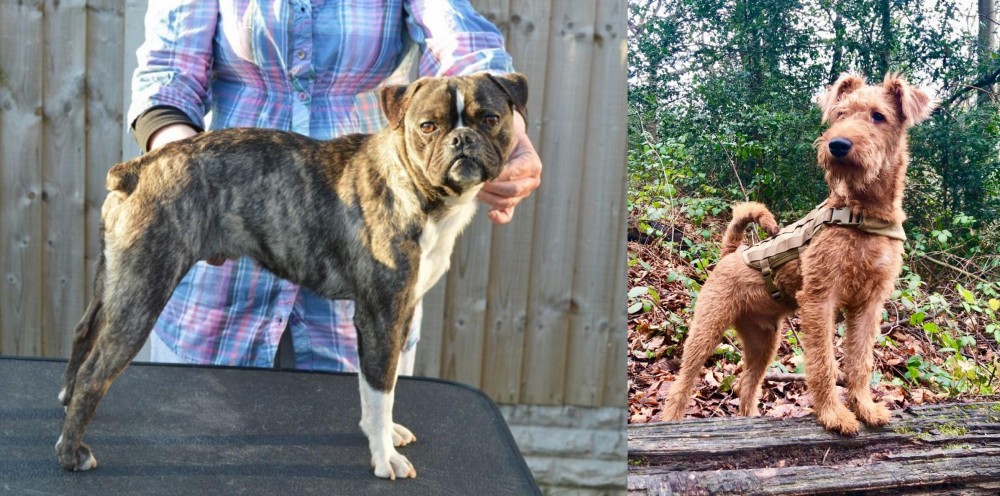 Fruggle is originated from United States but Irish Terrier is originated from Ireland. Fruggle may grow 14 cm / 5 inches shorter than Irish Terrier. Both Fruggle and Irish Terrier are having almost same weight. Both Fruggle and Irish Terrier has same life span. Both Fruggle and Irish Terrier has almost same litter size. Both Fruggle and Irish Terrier requires Moderate Maintenance.
Fruggle is originated from United States but Irish Terrier is originated from Ireland. Fruggle may grow 14 cm / 5 inches shorter than Irish Terrier. Both Fruggle and Irish Terrier are having almost same weight. Both Fruggle and Irish Terrier has same life span. Both Fruggle and Irish Terrier has almost same litter size. Both Fruggle and Irish Terrier requires Moderate Maintenance.
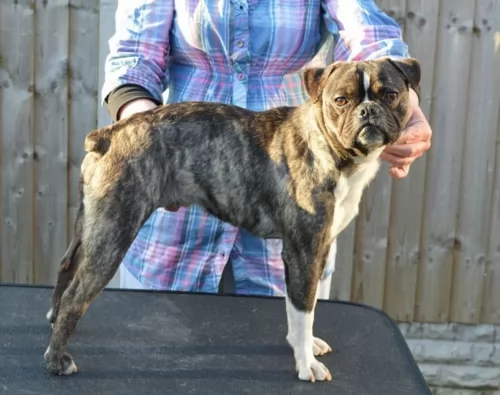 The Fruggle is a mixed breed/hybrid crossover between a Pug and a French Bulldog. The “Frug” is considered a designer breed, developed in the United States and growing in popularity. These hybrid dogs all can be different taking their looks and characteristics from one or both of the parent dogs in different ways. Within the same litter you can have pups that look like pugs and act like French Bulldogs or look like French Bulldogs and act like pugs.
The Fruggle is a mixed breed/hybrid crossover between a Pug and a French Bulldog. The “Frug” is considered a designer breed, developed in the United States and growing in popularity. These hybrid dogs all can be different taking their looks and characteristics from one or both of the parent dogs in different ways. Within the same litter you can have pups that look like pugs and act like French Bulldogs or look like French Bulldogs and act like pugs.
Also known as a Frenchie Pug, the hybrid is growing in popularity and new to the United Kingdom but recognized by the American Canine Hybrid Club. It is not recognized by the AKC or American Kennel Club. They are developed from purebred dogs but are not a purebred breed at this time. It would take generations of breeding true for that to happen. At the same time the Fruggle is an adorable little dog with characteristics of both its purebred parents.
The French Bulldog is a descendent of dogs that lived with ancient Greeks, the Molossians Phoenician traders spread the dog throughout the known world. These dogs were used in dogs fights and sporting until 1835 when these were outlawed. The Frenchie became a companion dog for the ladies of Paris, writers, artists and fashion designers. The Pug, on the other hand, can trace their history as far back as Confucius in 700BC. They are one of the most ancient dog breeds in existence today. They were the property of the Imperial Family in China, guarded by soldiers. Stealing a pug in Imperial China was punishable by death.
There is no real history or the Fruggle as it is too young in its existence as a separate type of dog. It is considered a breed – just a hybrid breed. In addition to the American Canine Hybrid Club, it is also recognized by the International Designer Canine Registry, the Designer Breed Registry, the Dog Registry of America and the Designer Dogs Kennel Club.
 The Irish Terrier is a dog breed from Ireland and one of the many different terrier breeds there are.
The Irish Terrier is a dog breed from Ireland and one of the many different terrier breeds there are.
Nobody is too sure of the Irish Terrier's history but it is one of the oldest terrier breeds. It appears as if the dog breed was developed from a wheat colored terrier and the extinct black and tan terrier.
It was always a common practice to crop the ears of terriers, but in 1889 the Irish Terrier Club required that the ears remain uncropped. The first Irish Terrier was shown in 1881, and the first Irish Terrier registered with the American Kennel Club was in 1885. The Irish Terrier Club of America was founded in 1896.
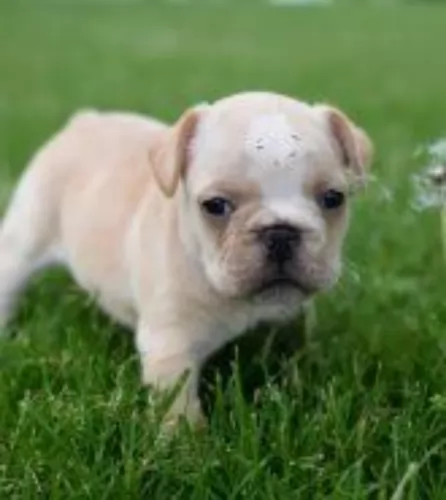 Being a designer dog, the appearance and characteristics of the Fruggle varies from pup to pup. Most do have flat faces, large eyes, and short muzzles. The Frug is a short, sturdy and compact dog. Their tail is over the back in a tight curl, and the ears are round and large. They are called Rose Ears. The nose and eyes are black or very dark and they have wrinkles on the forehead. This is the basic generalization of a mix between the Pug and the French Bulldog. The reality is they are all different. Most often they have a Pugs face with the French Bulldogs ears. They are a little smaller than the French Bulldog and a little larger than the Pug. Their hair is fine, glossy, smooth and short.
Being a designer dog, the appearance and characteristics of the Fruggle varies from pup to pup. Most do have flat faces, large eyes, and short muzzles. The Frug is a short, sturdy and compact dog. Their tail is over the back in a tight curl, and the ears are round and large. They are called Rose Ears. The nose and eyes are black or very dark and they have wrinkles on the forehead. This is the basic generalization of a mix between the Pug and the French Bulldog. The reality is they are all different. Most often they have a Pugs face with the French Bulldogs ears. They are a little smaller than the French Bulldog and a little larger than the Pug. Their hair is fine, glossy, smooth and short.
 The Irish Terrier is a medium sized dog who stands between 45cm and 50cm and weighs in the region of 11 to 12kg. He has a short, dense, wiry double coat which is a red, golden, sandy, wheaten color.
The Irish Terrier is a medium sized dog who stands between 45cm and 50cm and weighs in the region of 11 to 12kg. He has a short, dense, wiry double coat which is a red, golden, sandy, wheaten color.
The ears of the dog are semi-erect/semi-floppy and the tail is held high and curved.The chest is deep and muscular and the front and back legs are strong, long and muscular.
The Irish Terrier is a companion dog today, even though he was once a guard- and hunting dog. He is an amicable dog while also being alert and active. He is also independent and strong-willed so he will require training and socialization as then he becomes obedient and relaxed and much easier to live with.
They're social dogs too, loving all the members of their human family, getting on well with children in the home.
 The Fruggle is very child friendly
The Fruggle is very child friendly
The Fruggle is a good watchdog and can be taught many tricks.
He is not very adaptable. He can live in city and in apartments much better than in the country or on farms. He needs air conditioning
Is very high as the Fruggle is very intelligent
 Irish Terriers are good with people and want to be an active member of their human families.
Irish Terriers are good with people and want to be an active member of their human families.
They are active dogs and will require ongoing mental and physical stimulation. This is a lively dog, but he still loves to spend quiet time indoors with his family.
They’re intelligent dogs with a strong sense of loyalty towards their owner, making excellent family pets.
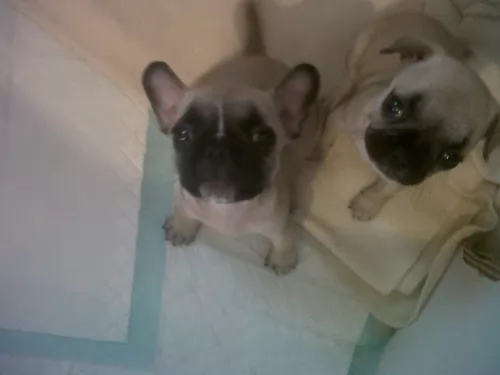 The Fruggle can inherit any of the health issues of either parent or they might be healthier than either parent. Some of the issues that the Fruggle might face include:
The Fruggle can inherit any of the health issues of either parent or they might be healthier than either parent. Some of the issues that the Fruggle might face include:
 The Irish Terrier is a healthy dog breed and you won't find yourself running to the vet often with him, but still he can land up with one of the common dog problems.
The Irish Terrier is a healthy dog breed and you won't find yourself running to the vet often with him, but still he can land up with one of the common dog problems.
It is always wise to be aware of hip dysplasia as this is a disease which can occur in all dog breeds and all dog ages. Also look out for eye diseases such as progressive retinal atrophy and cataracts as these can lead to blindness in your pet.
There is a disease known as cystinuria which is quite a concern with Irish Terriers. It’s an inherited kidney disease where increased amounts of arginine, lysine, amino acids cystine and ornithine are excreted in the urine.
In well-functioning kidneys, blood is filtered so as to create urine. Cystine is reabsorbed back into the bloodstream but with dogs affected with cystinuria they cannot reabsorb cystine back in their bloodstream, causing an accumulation in the urine. Dogs with cystinuria suffer inflammation of the urinary tract and can also develop urinary blockage and kidney failure. Immediate veterinary intervention is required.
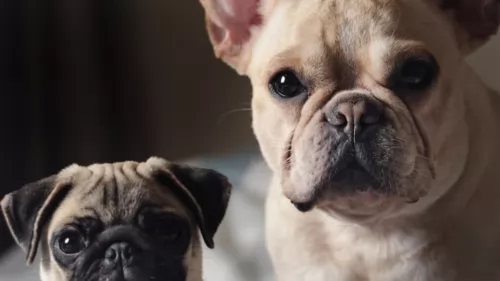 1/2 cup should be fed daily in two to three meals of high quality dry puppy food
1/2 cup should be fed daily in two to three meals of high quality dry puppy food
1/2 to 2 cups should be fed daily in two meals of high quality dry adult food
Quite often the first generation hybrid has much better health than either of the founding breeds. The same is not true of the second and third generations.
The Fruggle is a laid back dog requiring very little exercise. A daily walk or rolling a ball around the apartment is enough for him. The Fruggle should NOT be exercise vigorously or excessively due to its smashed face and Brachycephalic Syndrome. Weekly visits to a dog park would be sufficient as well. Do not take him out in excessive cold or heat.
 The coat of the Irish Terrier requires a brush twice a week to keep it bright. If you intend showing your dog, the coat will need to be stripped a couple of times a year to maintain the texture and color.
The coat of the Irish Terrier requires a brush twice a week to keep it bright. If you intend showing your dog, the coat will need to be stripped a couple of times a year to maintain the texture and color.
Other Irish Terrier owners take their dog to the groomers to have the coat clipped. The dog doesn't shed a lot and they are referred to as being somewhat hypoallergenic.
As with any other dog breed, other grooming needs with your Irish Terrier will include clipping the nails, checking his teeth for plaque build-up and checking inside the ears for infection.
If you're unsure how to perform these grooming procedures with your pet, simply ask your vet who will explain to you precisely how to ensure your dog remains in tip top condition.
He's a fairly active dog so you want to make sure that you are attending to his exercise needs. Take him for a walk every day, and if you've got a good sized garden, throw a ball for him. If you're a jogger you can count him in.
What you feed your Irish Terrier will depend a lot on his age and his activity levels. Every dog is a unique individual and nothing is set in stone regarding their diets. Just like people though, feeding him a lot of junk food will contribute to illness and shorten his lifespan.
He needs quality food. If you buy commercially manufactured food, make sure to read up on how much to feed him. Try and mix in some cooked chicken, brown rice and vegetables from time to time as well as some raw meat.
Learn to know what foods are toxic for him. Make sure he has a bowl of fresh, cool water constantly available to him.